Spring Break in Honduras
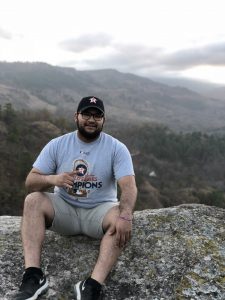
Caleb Casas, junior management and marketing major from Houston, TX.
Over spring break, the Griggs Center and Halbert Institute partnered to send a group of students led by Dodd Roberts with Dr. Sarah Easter to Honduras. The group collaborated with Mission Lazarus to work within the communities on a service trip. Caleb Casas, a junior marketing and management major from Houston, was one of the students who went and served. Part of the trip entailed meeting with small business owners to help them with current endeavors and to develop new business ideas. Led by Dr. Sarah Easter and Erika Teilmann, a junior management major from Houston, the group of students met for several weeks before their departure to learn about the business climate of the communities they would be working amidst in Honduras. They researched the businesses, resource availability, education levels, income levels, and more. The group kept it a priority to remember that they were not the experts and that they need to trust the people that actually live and work with people in those communities, the people that understand the everyday circumstances, to determine the feasibility of an idea. The students were challenged to read Philippians 2:1-8 before going into the communities to prepare a servant heart within themselves and to learn of and how to imitate Christ’s humility.
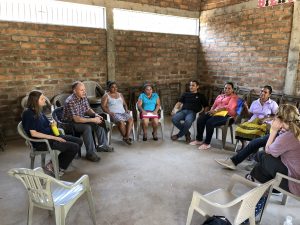 Caleb and the other students met with locals in Namasigue and Cedeño, villages in Honduras, to help build existing businesses and develop new ideas. The people talked about how they would use their businesses to help out the community: to make it possible for everyone to have a little money to buy from one another, to send kids to school, to give to the church, to employ others, and more. In the Namasigue village, all of the businesses are tied together. If only a few people operate a business, then the rest of the village would be unable to purchase from them and would force business owners to sell to ‘coyotes,’ people from bigger cities who come to purchase products in the villages at an extremely low price. It seemed to Caleb that the people had an excellent grasp of how to operate a business in the village but desired feedback on their ideas. They taught the villagers basic accounting so that they could better run their businesses by keeping accurate records, financial statements, and balancing the cost of the business. Both the students and the villagers were able to learn a lot from each other. For example, they met with a woman who planned to sell pigs and wanted to start off with ten. The group encouraged her to start off with three and to buy three pigs every few months so that she had a cycle of product and a steady stream of income instead of trying to sell all of her pigs at the same time. The group suggested that she purchase a male and female to begin breeding so that she wouldn’t have to buy pigs to resell but the women explained that the time and money it takes to breed with the resources available to her was too great for her to ever make a profit.
Caleb and the other students met with locals in Namasigue and Cedeño, villages in Honduras, to help build existing businesses and develop new ideas. The people talked about how they would use their businesses to help out the community: to make it possible for everyone to have a little money to buy from one another, to send kids to school, to give to the church, to employ others, and more. In the Namasigue village, all of the businesses are tied together. If only a few people operate a business, then the rest of the village would be unable to purchase from them and would force business owners to sell to ‘coyotes,’ people from bigger cities who come to purchase products in the villages at an extremely low price. It seemed to Caleb that the people had an excellent grasp of how to operate a business in the village but desired feedback on their ideas. They taught the villagers basic accounting so that they could better run their businesses by keeping accurate records, financial statements, and balancing the cost of the business. Both the students and the villagers were able to learn a lot from each other. For example, they met with a woman who planned to sell pigs and wanted to start off with ten. The group encouraged her to start off with three and to buy three pigs every few months so that she had a cycle of product and a steady stream of income instead of trying to sell all of her pigs at the same time. The group suggested that she purchase a male and female to begin breeding so that she wouldn’t have to buy pigs to resell but the women explained that the time and money it takes to breed with the resources available to her was too great for her to ever make a profit.
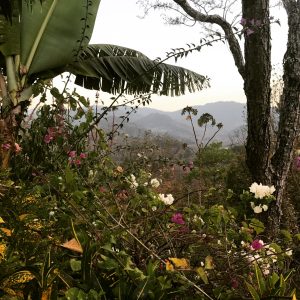 The students also built latrines in the villages as a part of Mission Lazarus’ public health campaigns that aim to engage the community through health promotion and prevention and share essential health teachings with families and communities. The latrines were a tremendous step in both sanitation and privacy for families in the communities. Caleb was struck by how something as small as a latch on a bathroom door gave people basic human dignity. “In America, we don’t have to ever worry about finding a private bathroom to use no matter where we go,” said Caleb. “But the simple act of installing a two-dollar latch allowed these people to go about their business in private and gave them dignity. There was a man who had gone over eighty years without a private bathroom and I was struck by how often I take something like a toilet for granted.” Caleb was also moved by the Hondurans’ gratitude and willingness to work. “They didn’t want us to do the work for them but wanted to work alongside us,” he noted. For the families to even receive a latrine, they had to dig the hole themselves before people would come install the physical latrine. For some people, this meant digging a twelve-foot hole with nothing but a shovel and a chisel. One man chiseled through two feet of solid rock alone. Even though they had done all of this back-breaking work to lay the foundation for the latrines, when the students came to install them, the villagers worked alongside them, helping mix and lay concrete, drilling, and installing the roof. After they had finished installing one of the latrines, a man came and gave them mangoes, which was all he had to give. Caleb was amazed that the people were so grateful that they were willing to give up all that they had to say thank you to the students.
The students also built latrines in the villages as a part of Mission Lazarus’ public health campaigns that aim to engage the community through health promotion and prevention and share essential health teachings with families and communities. The latrines were a tremendous step in both sanitation and privacy for families in the communities. Caleb was struck by how something as small as a latch on a bathroom door gave people basic human dignity. “In America, we don’t have to ever worry about finding a private bathroom to use no matter where we go,” said Caleb. “But the simple act of installing a two-dollar latch allowed these people to go about their business in private and gave them dignity. There was a man who had gone over eighty years without a private bathroom and I was struck by how often I take something like a toilet for granted.” Caleb was also moved by the Hondurans’ gratitude and willingness to work. “They didn’t want us to do the work for them but wanted to work alongside us,” he noted. For the families to even receive a latrine, they had to dig the hole themselves before people would come install the physical latrine. For some people, this meant digging a twelve-foot hole with nothing but a shovel and a chisel. One man chiseled through two feet of solid rock alone. Even though they had done all of this back-breaking work to lay the foundation for the latrines, when the students came to install them, the villagers worked alongside them, helping mix and lay concrete, drilling, and installing the roof. After they had finished installing one of the latrines, a man came and gave them mangoes, which was all he had to give. Caleb was amazed that the people were so grateful that they were willing to give up all that they had to say thank you to the students.
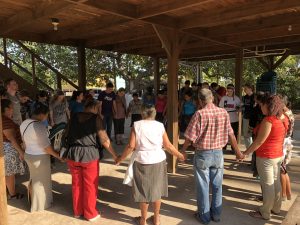 In Honduras, Caleb experienced and was impacted by was God’s purpose and design in bringing us to a specific time and place. Caleb’s grandfather was a pastor in Mexico but came to the US to start a Spanish-speaking congregation within Bammel Church in Houston. Caleb remembered hearing stories about his grandma growing up in Saltillo – no running water, an outhouse that was a mile away, playing soccer with rocks – and realized that, if it had not been for his grandfather saying “yes” to the Lord and leaving his work in Mexico, Caleb could have been in a similar situation to the people he was serving in Honduras. “I was serving what could have been my grandpa,” Caleb realized. “Maybe in three generations, like my family, those people could be in America or helping grow Honduras. You never know what impact you or God will have on people and their life trajectory.”
In Honduras, Caleb experienced and was impacted by was God’s purpose and design in bringing us to a specific time and place. Caleb’s grandfather was a pastor in Mexico but came to the US to start a Spanish-speaking congregation within Bammel Church in Houston. Caleb remembered hearing stories about his grandma growing up in Saltillo – no running water, an outhouse that was a mile away, playing soccer with rocks – and realized that, if it had not been for his grandfather saying “yes” to the Lord and leaving his work in Mexico, Caleb could have been in a similar situation to the people he was serving in Honduras. “I was serving what could have been my grandpa,” Caleb realized. “Maybe in three generations, like my family, those people could be in America or helping grow Honduras. You never know what impact you or God will have on people and their life trajectory.”
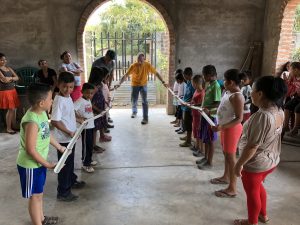 Another surreal moment that Caleb experienced in Honduras was meeting Luis, the preacher of the Honduran church the group was working with. Luis was born in Honduras but moved to the US and actually attended Caleb’s Bammel. Bammel Church sponsored Luis to attend the Baxter Institute, a seminary school in Guatemala. Caleb’s grandfather also taught classes at Baxter during Luis’ time there. Once Luis graduated, he had twenty-three churches where he could have served but felt a calling to go to Namasigue. Caleb was amazed at how God brought them together and connected them at this specific time and place where they were both serving together. “There were so many points in our lives where things could have happened differently,” Caleb said. “Nonetheless, God intersected our lives and that made an impact on me.”
Another surreal moment that Caleb experienced in Honduras was meeting Luis, the preacher of the Honduran church the group was working with. Luis was born in Honduras but moved to the US and actually attended Caleb’s Bammel. Bammel Church sponsored Luis to attend the Baxter Institute, a seminary school in Guatemala. Caleb’s grandfather also taught classes at Baxter during Luis’ time there. Once Luis graduated, he had twenty-three churches where he could have served but felt a calling to go to Namasigue. Caleb was amazed at how God brought them together and connected them at this specific time and place where they were both serving together. “There were so many points in our lives where things could have happened differently,” Caleb said. “Nonetheless, God intersected our lives and that made an impact on me.”
Caleb was absolutely impacted during his time in Honduras. The opportunity to serve and work alongside the people in Namasigue and Cedeño showed him how God works in incredible and mind-blowing ways and His plan is always good. Caleb looks forward to the potential to return to Honduras soon and is even talking about going back this summer.
 The Lytle Center for Faith and Leadership Development is an emerging organization within COBA. The mission of the Lytle Center is to challenge individuals to wholeheartedly follow Christ, equipping them to be leaders of integrity at home, work and in their community. The Lytle Center holds weekly chapel for students, with guest speakers from a variety of backgrounds who come speak to students about the ways in which they enact their faith in their leadership roles and how students can do the same. This semester, Lytle Center Chapel has had the pleasure of welcoming guests like Anthony Williams, the mayor of Abilene, who encouraged students to have the courage to get out of their comfort zones and face the issues before them in order to lead well.
The Lytle Center for Faith and Leadership Development is an emerging organization within COBA. The mission of the Lytle Center is to challenge individuals to wholeheartedly follow Christ, equipping them to be leaders of integrity at home, work and in their community. The Lytle Center holds weekly chapel for students, with guest speakers from a variety of backgrounds who come speak to students about the ways in which they enact their faith in their leadership roles and how students can do the same. This semester, Lytle Center Chapel has had the pleasure of welcoming guests like Anthony Williams, the mayor of Abilene, who encouraged students to have the courage to get out of their comfort zones and face the issues before them in order to lead well.